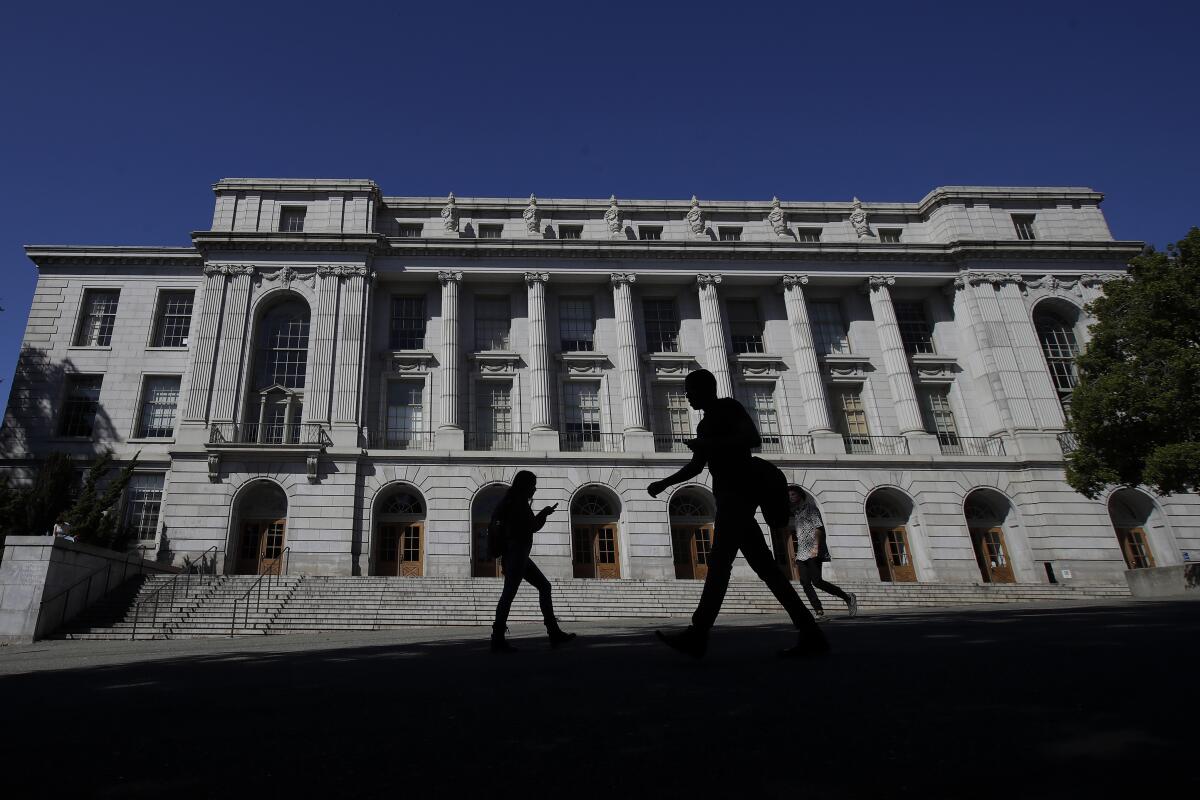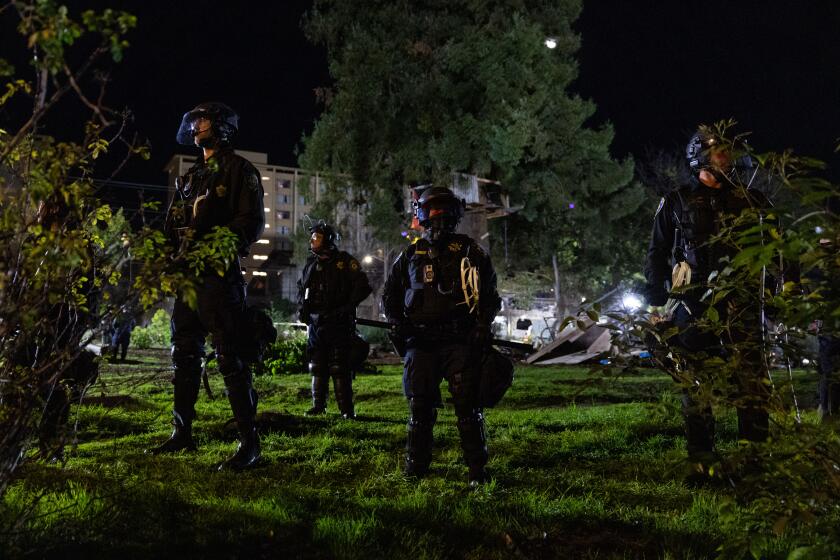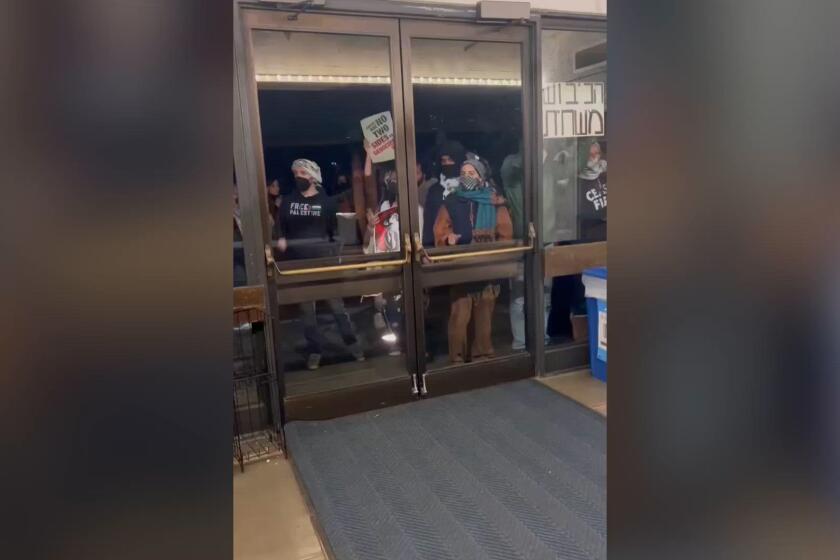UC Berkeley parents hired private security, fearing for their kids

For 17 days, a private security force patrolled UC Berkeley on foot and on bicycles but did not step onto the campus or coordinate with campus police.
The SafeBears ambassadors made their rounds throughout the night and into the early morning, wearing bright yellow uniforms but carrying no weapons. But the highly rated university did not deploy the extra security detail. They were paid by parents concerned for their childrenâs safety while attending the college during a surge in crime.
And the university is not happy about it, saying parents should instead be donating to bolster the campus security team.
The program ran from March 6 to 23 and was formed in response to what SafeBears organizers see as an inadequate response from the university to a growing crime problem in and around the school.
The parent group paid roughly $42,000 for six unarmed guards to patrol around the student housing and south of the campus.
âThere were some requests for service, escorts or directions. But really the No. 1 service these guys provided was just their physical presence being a deterrent to crime,â said SafeBears founder Sagar Jethani, who is a Southern California resident and father to two UC Berkeley students.
SafeBears ambassadors patrolled from 6:30 p.m. to 3 a.m., and organizers hope the university will create their own permanent nightly ambassador program. The pilot program was meant to end as students headed out for spring break, Jethani said.
The multimillion-dollar cost for UC Berkeley of walling off Peopleâs Park will grow with bills from outside agencies and continued security to keep people out.
University officials have not exactly welcomed the SafeBears effort with open arms, saying in a statement that the program âraises a number of concerns including the training and experience of individuals hired by such firms.â
UC Berkeley also said any security effort has to be coordinated with the University of California Police Department, regardless of where the money comes from.
âA holistic approach to campus safety is required and is the most effective approach,â the statement said.
There are roughly 1,300 members under the SafeBears banner â concerned parents who meet online, Jethani said. By comparison, UC Berkeley has 45,699 students, including about 33,000 undergraduates, according to the latest data from the university.
UC Berkeley law professor Jonathan Simon is skeptical about the SafeBears ambassadors program, telling the San Francisco Chronicle it âseems more like a stunt than study.â
In an email to The Times, Simon wrote, âThe image of campus as awash with crime was exaggerated to begin with.â
The SafeBears parent group formed after an October 2022 shooting that unfolded outside the university and left one man dead and three others wounded. No students were involved in the shooting and the university hired a private security company to patrol around the campus for a brief period.
Jethani, a marketing executive for an audio firm, said he was upset by the universityâs response to the incident and an overall increase in crime that has not resulted in more security guards being hired to patrol around the campus.
About 200 protesters shut down a private event at UC Berkeley that featured Ran Bar-Yoshafat, an Israeli attorney and former member of the Israel Defense Forces.
From 2021 to 2022, robberies on campus jumped from 14 to 25 per year and aggravated assaults increased from 54 to 63, according to the latest data from the U.S. Department of Education. Sexual assaults decreased from 34 reported rapes and incidents of fondling, down to 17 for both categories the following year.
Reports of vehicle thefts surged from 81 in 2021 to 307 the following year, with the majority of thefts being e-scooters and e-bikes.
Reported crimes off campus also increased over the last year, according to the Berkeley Police Department. There were 7,960 total violent and property crimes in 2023, versus 7,201 in the previous year, with a jump in sexual assaults, robberies and burglaries, according to the latest data.
Campus police employ 45 sworn officers, with three recruits in the police academy, according to a university spokesperson. The university also has an ongoing partnership with the city police department and offers security services such as a night shuttle. University officials are also working to expand the hours for their own campus ambassadors who work in the field.
The SafeBears ambassadors arrived at a tumultuous time for the campus.
In January, a few months before the ambassadors arrived, UC Berkeley spent $7.8 million to deploy a police force to clear out Peopleâs Park, the storied 2.8-acre green space that activists seized in the 1960s to serve as a gathering space for nonconformists. The university built a 17-foot-high perimeter around the green space that is expected to be developed into student housing.
University leadership is also embroiled in a standoff with a group of protesters who have taken over a central bridge on campus. Protesters calling for a cease-fire in the bombing of Gaza by Israeli forces have blocked access to Sather Gate at UC Berkeley, prompting Chancellor Carol Christ to call for a reexamination of the universityâs procedures surrounding protests, according to the campus newspaper the Daily Californian.
The U.S. Department of Education launched an investigation of UC Berkeley for alleged discrimination involving shared ancestry.
SafeBears ambassadors were trained and vetted through the security company StreetPlus, which already has a contract with the Downtown Berkeley Assn., a nonprofit property owners group.
Jethani called the pilot program a success, citing an incident in which an ambassador intervened as a woman was being attacked off campus. The woman did not file a police report, so details of the incident remain with the SafeBears organizers, who say they will eventually present their programâs findings to the university.
âWeâre rather hoping the school will eliminate the need for us to continue doing this by just putting its own program in place as they ought to have by now,â Jethani said.
University officials say they believe the parentsâ funds would be better spent hiring more sworn and non-sworn police officers, a UC Berkeley spokesperson said in a statement.
âParents who want to donate funds toward additional campus security can do so via a university fund that has been established,â the statement said. âWe do not believe that private security should take precedence over hiring sworn officers.â
More to Read
Sign up for Essential California
The most important California stories and recommendations in your inbox every morning.
You may occasionally receive promotional content from the Los Angeles Times.















